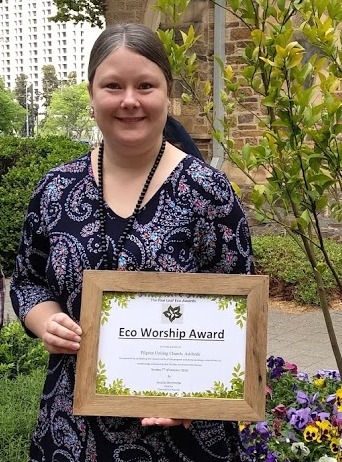Helping parishioners to take action against climate change may be a best practice method for pastors to help church members with climate anxiety, according to Uniting Earth Ministry advocate Jessica Morthorpe, who is running a one-day conference to equip pastors minister in this challenging area.
Morthorpe believes climate anxiety in our community has reached such a pitch that it is becoming the psychological equivalent of the cold war for our times – but instead of fearing mutually assured destruction from nuclear warheads, the feared catastrophe of our generation is the survival of the planet from climate change.
She notes several signs that climate anxiety is leading to changes in behaviour and risks to mental health. For example, a recent survey of more than 6500 women by the Australian Conservation Foundation and the charity 1 Million Women found that “For women between 30 and 39 years, 22 per cent said they were reconsidering having children or more children because of climate change.”
Yet environmental concerns are not something Christians normally take to their pastor, particularly if they belong to a church that struggles with the idea that faith should be political and that Christians should be politically active.
“They are getting very anxious about their futures and the futures of their children and grandchildren.” – Jessica Morthorpe
This is why Morthorpe – in her role of advocate to Uniting Earth Ministry, part of the Social Justice Forum, Uniting Church NSW/ACT – is leading a Climate Pastoral Care Training Day in Sydney on May 28 to give pastors access to best practice techniques in how to minister to people whose mental health is affected by climate change.
She makes the point that unlike other types of anxiety, which can blow worries out of proportion, anxiety about the future of the planet is a rational response commensurate with reality.

Jessica Morthorpe presents a Five Leaf Eco-Award to Pilgrim Uniting Church in South Australia
The Intergovernmental Panel on Climate Change (IPCC) last year warned that the world has only 12 years to avoid catastrophic levels of climate change.
“The IPCC and environmental organisations around the world have been working hard to highlight the urgency of the need for action on the climate crisis, and awareness is rising in our communities,” she says.
“As the science is sinking in, and people are realising how bad things are getting, they are getting very anxious about their futures and the futures of their children and grandchildren.”
Morthorpe says psychologists recommend that the best way to deal with climate anxiety is to take action and get involved in activism rather than trying to make the anxiety go away.
“What we need to do instead is find healthy ways to channel their anxiety into making a difference. For example, if you are a supportive minister who is willing to organise for the congregation together to take some activist action or to plant some trees or put on solar panels – if it feels like you’re surrounded by a supportive community who are helping them to make change, then that’s going to be a positive response.
“But if a minister is not aware and thinks climate change is not an important issue, or not a faith concern, then that person will have to deal with their anxiety on their own, and they are going to feel isolated and like there is no one they can talk to.
“One of our hopes for this conference is that it will invite a broader audience into the conversation around climate change. Instead of seeing the environment as a peripheral thing, or a low priority, we hope that by showing how it links with pastoral care – something that is clearly central to every minister’s work – we might encourage people to come along who want to know how to provide the best pastoral care for their congregation. Then they might realise that climate change is more serious and relevant to the church than they thought. So maybe rather than it than being on a list of 500 priorities that they might get around to one day, they might think ‘we need to make this a bit more central to what we’re doing.’”
Morthorpe believes climate change is a clear issue for Christians because it is an issue of inequality, disproportionately affecting the poor.
“For example, in the Uniting Church we have a lot of relationships with our Pacific Island brothers and sisters and Australia’s First Peoples, and they are all directly affected by climate change right now.
“I have friends who live on Kiribati and I have talked to them about the awful impact it is having on them – to know that the country that you love, where your ancestors are buried, lands that are deeply spiritual for them, and that they never want to leave – is going underwater. No matter how much they pray. There’s just nowhere more than two metres above sea level in Kiribati. And losing their land doesn’t just mean losing their homes, but possibly their culture, their whole way of life, as they are forced to move elsewhere. It’s an awful situation for them to be in.
“So my brothers and sisters in Christ, who I’m called to love and serve, the reason they are suffering is because of rich people in countries like Australia who think our convenience and luxury are more important than these suffering people. That is clearly not the way of Jesus.”
Morthorpe says she has been passionate about the environment her whole life and a member of the Uniting church since she was a tiny tot.
“They’ve always been the two pillars of my life – my faith and my love of the environment –
but for a long time it was a real struggle because I didn’t know how to put them together. The church I grew up in didn’t have the resources to tell me how my faith should relate to the environment, so I listened to wider society, which said that as Christians we believed we had been given dominion over the earth and we were allowed to use it however we liked. Everything in me said that was wrong, and that this didn’t fit with the God I knew in Jesus, but it seemed like that was what Scripture said, so it was a very painful thing. My heart felt torn in two.”
She started to resolve this conflict after being asked to give a talk on what her faith had to say about the environment at an interfaith conference on climate change for young people in 2008.
“In doing the research I discovered the field of eco-theology and I was like ‘oh, my gosh, the Bible is full of stuff about caring for the environment and I never really noticed.’ It was like such a paradigm shift – ‘how did I not see it?’
“After that conference I was like ‘if the Bible has all this stuff about what we should be doing for God’s creation, why aren’t churches at the forefront of trying to save the earth?’ So I looked around and saw programs in UK and US that were giving awards to churches.
So I set up the Five Leaf Eco-Awards in Australia. It’s a national ecumenical environmental awards program for churches. I’ve been doing it for just over 10 years voluntarily and it’s given me the chance to travel all round Australia and see all the amazing things churches are doing. I started it because I believed no one was doing anything but I discovered some congregations that are doing truly incredible things – it’s a fantastic grassroots movement. I would say it’s the work of the Holy Spirit gently guiding us into something we should have been doing all along.”
Morthorpe points out that eco-theology is not new at all but has been a strong thread through Christian tradition.
“We’re just recapturing that tradition, which has been a bit neglected recently. One clear example of this is all the stories of the early saints. We all know that St Francis of Assisi is famous for his relationship with animals, but actually all of them are surrounded by animal stories. One of the key ways that you knew someone was a Christian saint was by the way they treated God’s creatures with love and kindness.”
Email This Story
Why not send this to a friend?





